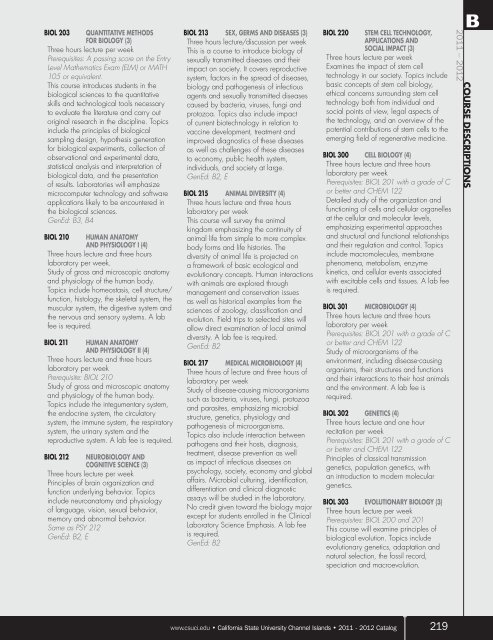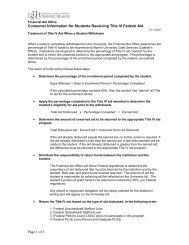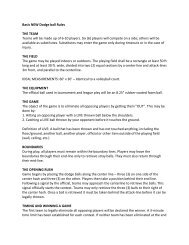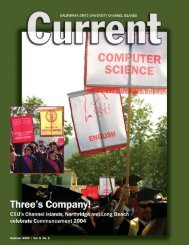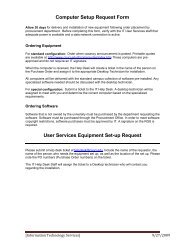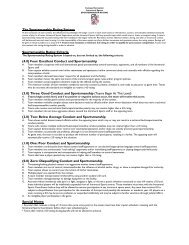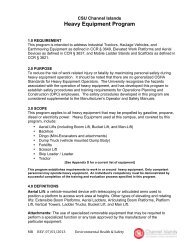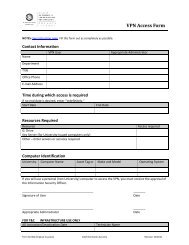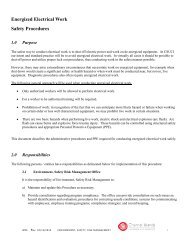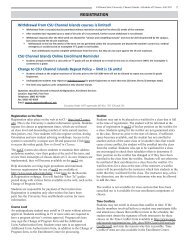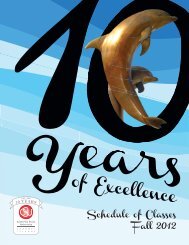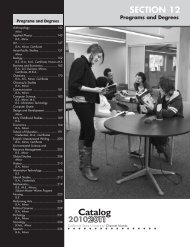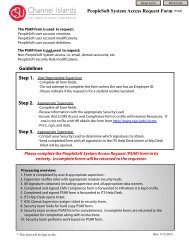Download printable catalog - CSU Channel Islands
Download printable catalog - CSU Channel Islands
Download printable catalog - CSU Channel Islands
You also want an ePaper? Increase the reach of your titles
YUMPU automatically turns print PDFs into web optimized ePapers that Google loves.
BIOL 203 QUANTITATIVE METHODSFOR BIOLOGY (3)Three hours lecture per weekPrerequisites: A passing score on the EntryLevel Mathematics Exam (ELM) or MATH105 or equivalent.This course introduces students in thebiological sciences to the quantitativeskills and technological tools necessaryto evaluate the literature and carry outoriginal research in the discipline. Topicsinclude the principles of biologicalsampling design, hypothesis generationfor biological experiments, collection ofobservational and experimental data,statistical analysis and interpretation ofbiological data, and the presentationof results. Laboratories will emphasizemicrocomputer technology and softwareapplications likely to be encountered inthe biological sciences.GenEd: B3, B4BIOL 210 HUMAN ANATOMYAND PHYSIOLOGY I (4)Three hours lecture and three hourslaboratory per week.Study of gross and microscopic anatomyand physiology of the human body.Topics include homeostasis, cell structure/function, histology, the skeletal system, themuscular system, the digestive system andthe nervous and sensory systems. A labfee is required.BIOL 211 HUMAN ANATOMYAND PHYSIOLOGY II (4)Three hours lecture and three hourslaboratory per weekPrerequisite: BIOL 210Study of gross and microscopic anatomyand physiology of the human body.Topics include the integumentary system,the endocrine system, the circulatorysystem, the immune system, the respiratorysystem, the urinary system and thereproductive system. A lab fee is required.BIOL 212 NEUROBIOLOGY ANDCOGNITIVE SCIENCE (3)Three hours lecture per weekPrinciples of brain organization andfunction underlying behavior. Topicsinclude neuroanatomy and physiologyof language, vision, sexual behavior,memory and abnormal behavior.Same as PSY 212GenEd: B2, EBIOL 213 SEX, GERMS AND DISEASES (3)Three hours lecture/discussion per weekThis is a course to introduce biology ofsexually transmitted diseases and theirimpact on society. It covers reproductivesystem, factors in the spread of diseases,biology and pathogenesis of infectiousagents and sexually transmitted diseasescaused by bacteria, viruses, fungi andprotozoa. Topics also include impactof current biotechnology in relation tovaccine development, treatment andimproved diagnostics of these diseasesas well as challenges of these diseasesto economy, public health system,individuals, and society at large.GenEd: B2, EBIOL 215 ANIMAL DIVERSITY (4)Three hours lecture and three hourslaboratory per weekThis course will survey the animalkingdom emphasizing the continuity ofanimal life from simple to more complexbody forms and life histories. Thediversity of animal life is projected ona framework of basic ecological andevolutionary concepts. Human interactionswith animals are explored throughmanagement and conservation issuesas well as historical examples from thesciences of zoology, classification andevolution. Field trips to selected sites willallow direct examination of local animaldiversity. A lab fee is required.GenEd: B2BIOL 217 MEDICAL MICROBIOLOGY (4)Three hours of lecture and three hours oflaboratory per weekStudy of disease-causing microorganismssuch as bacteria, viruses, fungi, protozoaand parasites, emphasizing microbialstructure, genetics, physiology andpathogenesis of microorganisms.Topics also include interaction betweenpathogens and their hosts, diagnosis,treatment, disease prevention as wellas impact of infectious diseases onpsychology, society, economy and globalaffairs. Microbial culturing, identification,differentiation and clinical diagnosticassays will be studied in the laboratory.No credit given toward the biology majorexcept for students enrolled in the ClinicalLaboratory Science Emphasis. A lab feeis required.GenEd: B2BIOL 220 STEM CELL TECHNOLOGY,APPLICATIONS ANDSOCIAL IMPACT (3)Three hours lecture per weekExamines the impact of stem celltechnology in our society. Topics includebasic concepts of stem cell biology,ethical concerns surrounding stem celltechnology both from individual andsocial points of view, legal aspects ofthe technology, and an overview of thepotential contributions of stem cells to theemerging field of regenerative medicine.BIOL 300 CELL BIOLOGY (4)Three hours lecture and three hourslaboratory per weekPrerequisites: BIOL 201 with a grade of Cor better and CHEM 122Detailed study of the organization andfunctioning of cells and cellular organellesat the cellular and molecular levels,emphasizing experimental approachesand structural and functional relationshipsand their regulation and control. Topicsinclude macromolecules, membranephenomena, metabolism, enzymekinetics, and cellular events associatedwith excitable cells and tissues. A lab feeis required.BIOL 301 MICROBIOLOGY (4)Three hours lecture and three hourslaboratory per weekPrerequisites: BIOL 201 with a grade of Cor better and CHEM 122Study of microorganisms of theenvironment, including disease-causingorganisms, their structures and functionsand their interactions to their host animalsand the environment. A lab fee isrequired.BIOL 302 GENETICS (4)Three hours lecture and one hourrecitation per weekPrerequisites: BIOL 201 with a grade of Cor better and CHEM 122Principles of classical transmissiongenetics, population genetics, withan introduction to modern moleculargenetics.BIOL 303 EVOLUTIONARY BIOLOGY (3)Three hours lecture per weekPrerequisites: BIOL 200 and 201This course will examine principles ofbiological evolution. Topics includeevolutionary genetics, adaptation andnatural selection, the fossil record,speciation and macroevolution.Course Descriptions2011 – 2012www.csuci.edu • California State University <strong>Channel</strong> <strong>Islands</strong> • 2011 - 2012 Catalog219


